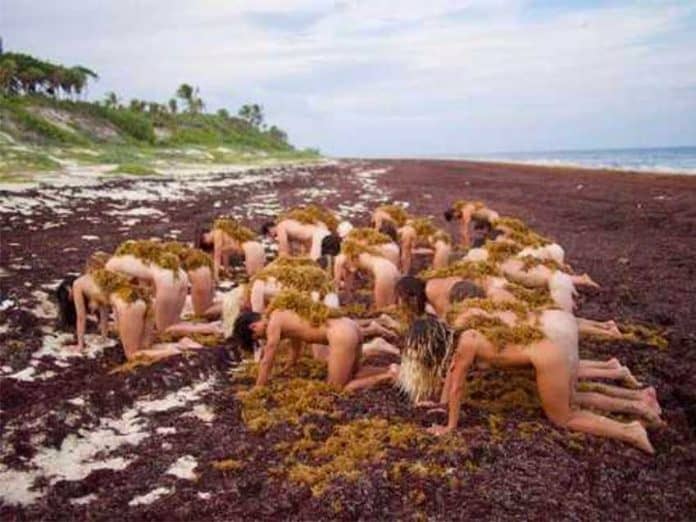The masses of sargassum seaweed that have washed up on Mexico’s Caribbean coast beaches inspired an impromptu nude photoshoot Saturday by renowned New York photographer Spencer Tunick.
The 51-year-old photographer, known internationally for his large-scale nude shoots, told the newspaper La Jornada that he was having an early dinner in Tulum, Quintana Roo, when a new friend told him about the sargassum problem and suggested that it could be incorporated into a new photo project.
“At our table, there were about 12 people. That was when José Antonio Silva, representative of the Makers movement, sat next to me and began to tell me about the sargassum problem,” Tunick said.
“He even wanted me to do a piece that night. It surprised me a lot, then I looked around and thought it was possible, as there were other diners who could be asked to participate to form a larger group.”
Silva invited Tunick to take a walk on the beach, which opened the artist’s eyes to the extent of the problem and convinced him to follow through with the proposal.
“It was incredible, José said that the moment to act was now and that I could help by doing a spontaneous work. By pure luck I had a camera with me. In total, 25 people posed, enough to create a good piece, which is expected to make people aware of the problem and [lead to] possible solutions in the immediate term,” he said.
For the spontaneous shots, Tunick asked his naked subjects to partially cover themselves with fresher and greener sargassum collected near the water because the older, brown seaweed was smelly and infested with mosquitoes and their larvae.
Then the photographer got to work, shooting the participants in different poses while draped in the seaweed that has arrived on Quintana Roo beaches en masse this year, discoloring the turquoise waters and white sand that make the coastline so popular with tourists.
The sargassum “resembles a massive invasive organism that seizes the coasts and beaches of Quintana Roo and the Caribbean. What was once a pristine beach now looks like the Upside Down world from the Stranger Things series,” Tunick said.
The photographer later uploaded a short video of the shoot to his Instagram account with a caption that read: “Seaweed is invading the beaches and coastline of the Yucatán and Caribbean. It’s a Natural Disaster due to humans.”
Tunick, a frequent visitor to Mexico with his family, photographed 18,000 naked people in Mexico City’s central square — the zócalo — in 2007 and has remarked that “Mexicans are very open-minded” about baring all for the camera.
He also completed two projects in San Miguel de Allende, Guanajuato, in 2014 and 2016.
The first featured 100 naked women wearing only garlands of orange marigolds in accordance with a Day of the Dead theme while in 2016 he shot 20 nude people standing on their heads in a work intended to illustrate the upside-down nature of the world order.
Source: La Jornada (sp), Yucatán Expat Life (en)
